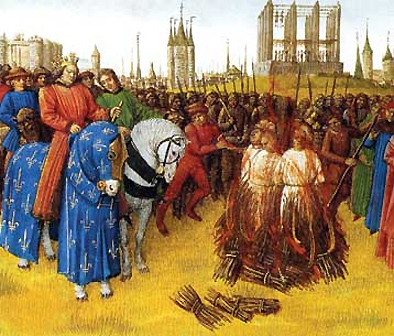 This story is mentioned by Alain Demurger in Vie et mort de l’Ordre du Temple. He quotes a very obscure book by Maurice-René Mazières entitled Mystères et Secrets des Templiers du Bézu. The legend comes from an oral tradition of that particular region in France.
This story is mentioned by Alain Demurger in Vie et mort de l’Ordre du Temple. He quotes a very obscure book by Maurice-René Mazières entitled Mystères et Secrets des Templiers du Bézu. The legend comes from an oral tradition of that particular region in France.
The King of France was traveling with his son and stopped at a small village of Brenac. A local lord entertained them in his castle. Always on the lookout for gifted and capable noblemen, the prince noticed that the lord’s son was well suited for royal service. He asked the youth if he would join his royal entourage as a page. “No, your highness, I cannot, for I have already decided to become a Knight Templar,” replied the young man. The prince was much displeased by this answer.
Years later when the prince finally became the King of France he initiated severe persecutions of the Knights Templar in his realm. Some of the Order’s best knights were burnt at the stake as heretics, using confessions extracted under torture. One day the king was looking at the long list of men who were about to be executed and stumbled upon a familiar name. He had his servants bring the man to him and immediately recognized the young lord of Brenac. The king wanted to show mercy to the knight convicted of heresy. He asked the Templar if he would now consider serving the king in exchange for having his life spared. “No, your majesty. I have decided to be a Knight Templar and I will stay true to my vows and to my Order.” The Templar from Brenac died at the stake alongside his comrades.
As Demurger notes, the story has some factual basis, because Philip III and his son, future Philip IV the Fair, indeed traveled through Brenac during the Aragonese Crusade. One is also reminded of Philip’s attention to finding the very best and loyal servants for himself. Men like Nogaret came to power during his reign despite their complete lack of noble lineage. It is likely that Philip the Fair also eagerly employed members of minor nobility. Regardless, a great and moving story. I really wish some poet noticed it back in the age when poetry was relevant. Coleridge? Wordsworth? Longfellow?